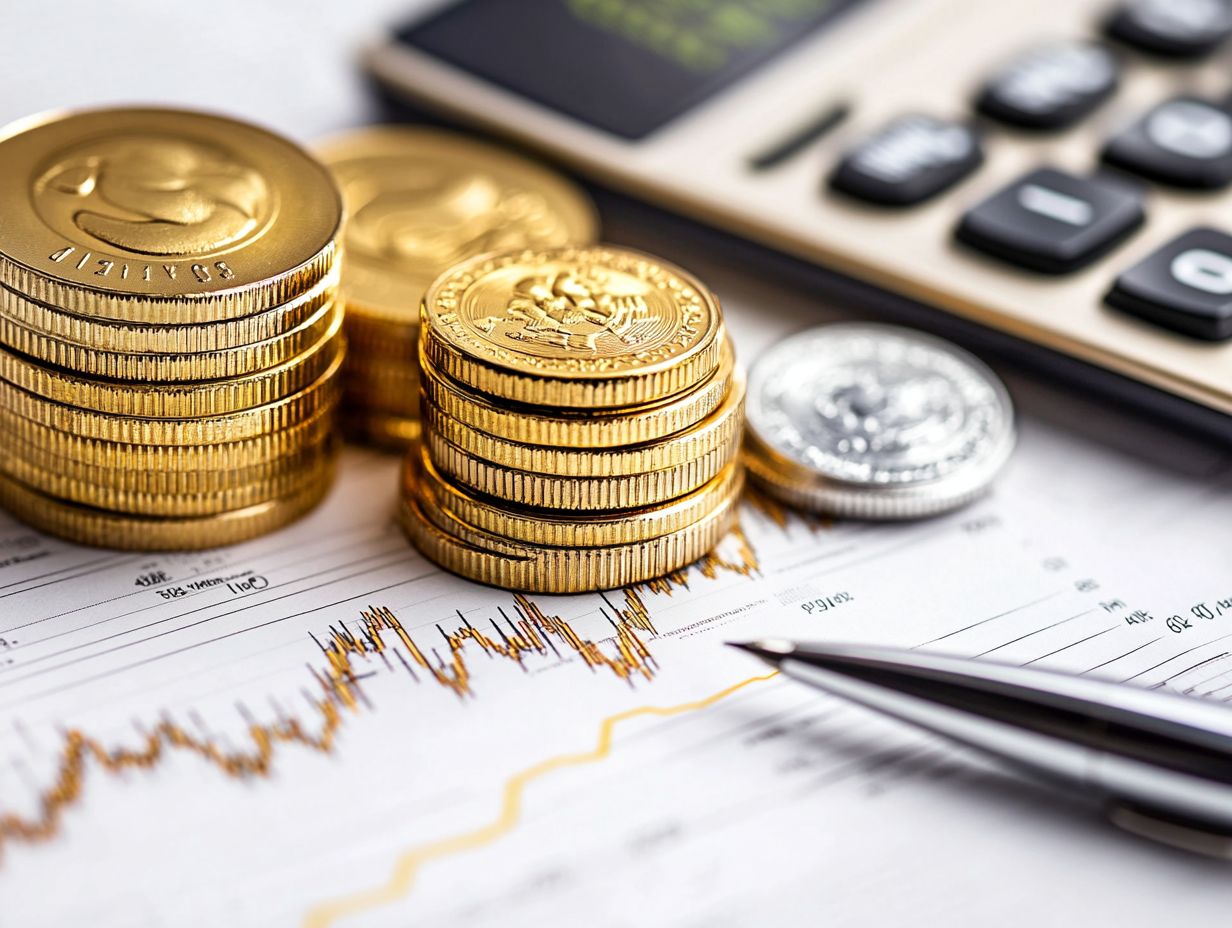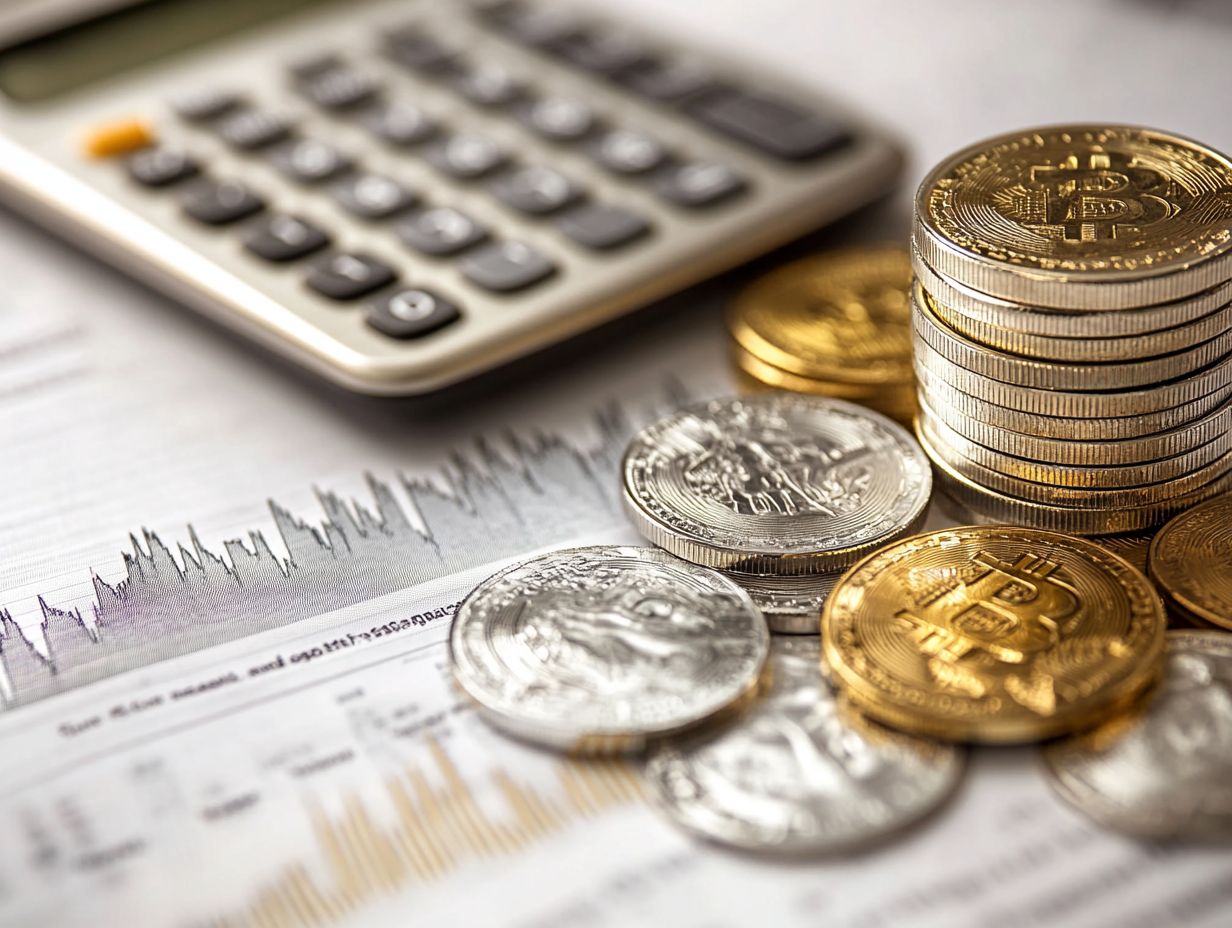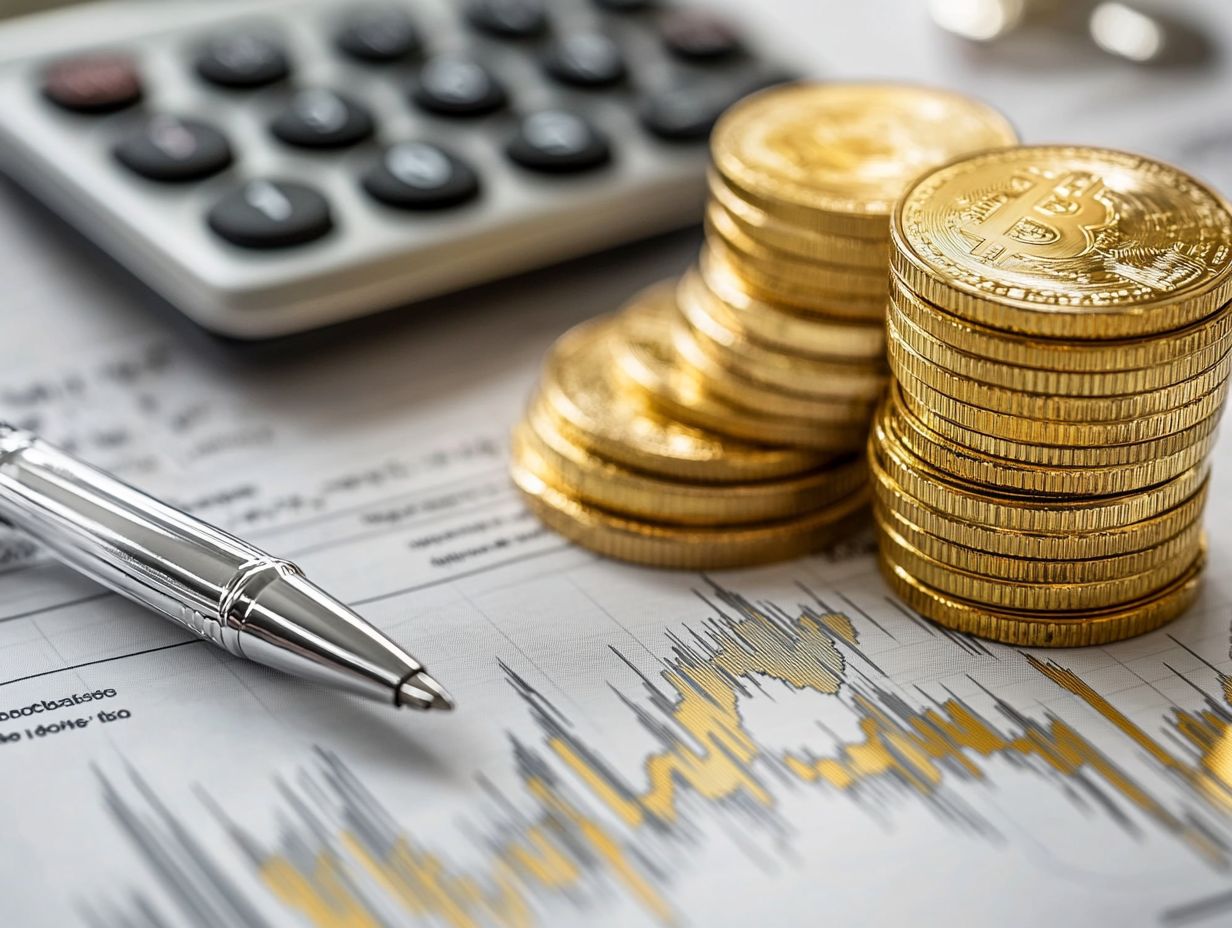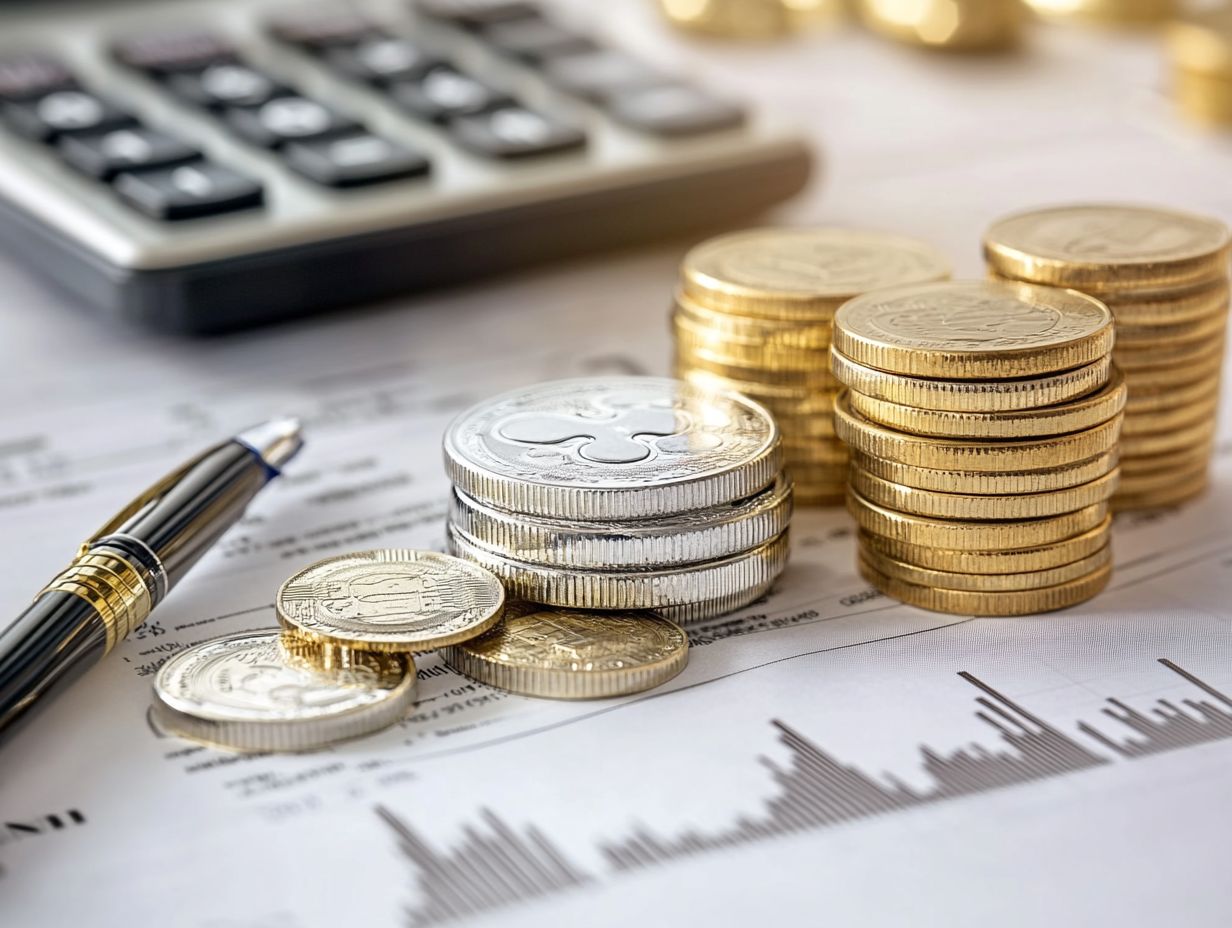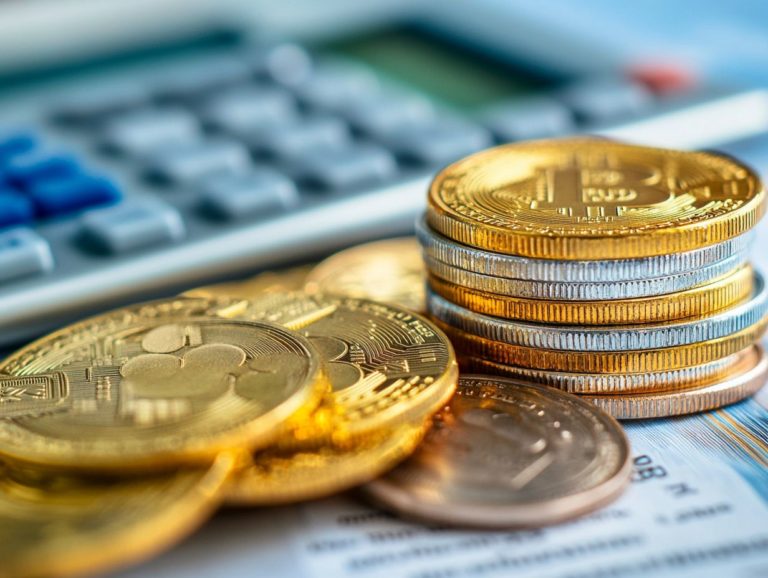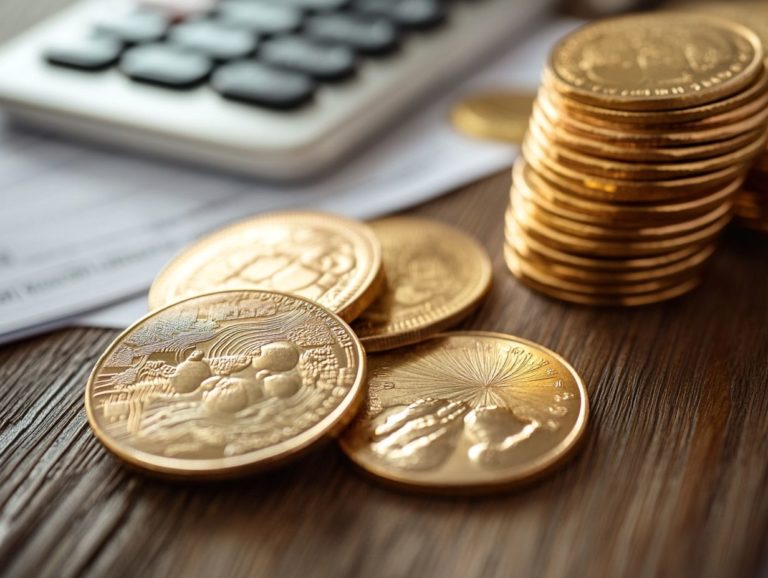Tax Considerations for Investing in Precious Metals Futures
Investing in precious metals futures presents an enticing opportunity for both seasoned investors and those just starting their journey.
The allure of gold, silver, and other precious metals continues to captivate the market. It’s crucial for you to grasp the potential benefits, including impressive returns and enhanced portfolio diversification.
Understanding the tax implications of these investments is crucial.
This article delves into the advantages of investing in precious metals futures, highlights key tax considerations, and offers practical tips to help you optimize your returns while minimizing tax burdens.
Dive into this investment world and unlock exciting possibilities today!
Contents
- Key Takeaways:
- Benefits of Investing in Precious Metals Futures
- Tax Implications of Investing in Precious Metals Futures
- Tips for Minimizing Taxes on Precious Metals Futures
- Utilizing Tax-Advantaged Accounts
- Strategic Timing of Trades
- Final Considerations for Tax Planning and Investing in Precious Metals Futures
- Frequently Asked Questions
- What are some tax considerations when investing in precious metals futures?
- Are there any tax benefits for investing in precious metals futures?
- How are capital gains taxes calculated for precious metals futures?
- Do I have to pay taxes on precious metals futures if I haven’t sold them?
- Are there any tax considerations specific to different types of precious metals futures?
- What happens if I incur a loss on my precious metals futures investment?
Key Takeaways:
- Precious metals futures could lead to exciting high returns for savvy investors looking to diversify their portfolio.
- Be aware of the tax implications, including capital gains tax and reporting requirements when investing in these futures.
- To minimize taxes on precious metals futures, consider using tax-advantaged accounts and timing trades strategically. Careful planning is essential before investing.
What are Precious Metals Futures?
Precious metals futures are financial contracts that allow you to buy or sell metals like gold, silver, and platinum at a predetermined price on a specific future date. This provides an opportunity to speculate on the price movements of these valuable resources.
These contracts play a significant role in the commodity markets, serving as a hedge against inflation and economic downturns. Understanding the dynamics of these investment vehicles is important for effective financial planning.
Operating under specific regulations ensures fairness in trading. This attracts a diverse range of investors, from individual traders to large financial institutions.
The allure of precious metals futures lies not only in their high liquidity but also in their ability to reflect the underlying physical commodities. For instance, gold is often seen as a safe-haven asset. Consequently, fluctuations in gold prices can significantly impact the market for silver and platinum futures, creating interconnectedness within the broader financial landscape.
As you navigate market uncertainties, incorporating these futures into your portfolio may provide an essential layer of risk management.
Benefits of Investing in Precious Metals Futures
Investing in precious metals futures offers a wealth of advantages, such as the potential for substantial returns and enhanced portfolio diversification.
This investment strategy also helps you hedge against financial uncertainty while minimizing tax implications.
Potential for High Returns
The potential for high returns in precious metals futures lies in the price changes of the commodities market, which can respond dramatically to global political situations and economic shifts that affect gold prices.
You may find yourself drawn to these markets, especially when you consider historical trends that showcase sharp price fluctuations capable of yielding significant profits.
Key factors such as inflation fears, currency strength, and global supply challenges shape the market value of these investments.
By understanding these dynamics, you can develop strategies that capitalize on price discrepancies and historical patterns. Using diverse investment vehicles like ETFs and options allows you to maximize returns while effectively managing risk.
This multifaceted approach ensures you aren’t just a passive observer; you become an active participant in the ever-evolving landscape of precious metals.
Diversification of Investment Portfolio
Diversifying your investment portfolio with precious metals futures can significantly boost your financial stability by reducing overall risk exposure. These assets have a low correlation with traditional classes like stocks and bonds, making them a strategic choice for any savvy investor.
This approach is essential for protecting your wealth, especially during times of economic uncertainty. While equities may face sharp declines, precious metals—particularly gold—tend to serve as a reliable store of value. They maintain their worth even in turbulent market conditions. Think of gold not just as a hedge against inflation but also as a safeguard against fluctuating currency values.
By incorporating these valuable assets into your investment strategy, you can effectively reduce risks and create a more balanced portfolio that can endure market volatility over time.
Tax Implications of Investing in Precious Metals Futures
Investing in precious metals futures comes with distinct tax implications that you need to grasp in order to navigate capital gains tax and IRS reporting requirements effectively. Understanding these nuances is crucial, as they can significantly impact your after-tax returns.
Capital Gains Tax
Capital gains tax is crucial for you to consider as a precious metals futures investor. The IRS classifies your gains from these investments as either short-term or long-term, which significantly influences your overall tax treatment and liability.
Understanding these distinctions is vital for figuring out how much you’ll owe based on your holding periods. Short-term capital gains, taxed as ordinary income, come into play when you sell assets within a year of purchasing them, potentially catapulting you into a higher tax bracket. On the flip side, long-term gains enjoy reduced tax rates, which incentivizes you to hold onto your investments for over a year.
By employing specific strategies—like timing your sales or utilizing tax-advantaged accounts—you can effectively manage and minimize your tax liabilities. This ensures that your profits from precious metals investments are as rewarding as they should be.
Reporting Requirements
Investors in precious metals futures must pay close attention to specific IRS reporting requirements to ensure compliance and sidestep potential penalties. This involves meticulously documenting all trading activity and gains.
You need to maintain organized records that capture every sale and purchase, making sure each transaction is reported accurately. Properly recording these details not only reduces the risk of audits but also assists you in calculating any capital gains or losses throughout the year.
As you navigate the complexities of tax regulations, keeping receipts, contracts, and account statements readily available is crucial. By diligently documenting your trading activities, you can confidently meet your tax obligations while taking advantage of potential deductions and exemptions that current laws provide.
Tips for Minimizing Taxes on Precious Metals Futures
To minimize taxes on your precious metals futures investments, you’ll need a thoughtful approach. This involves leveraging tax-advantaged accounts and seeking guidance from a knowledgeable financial advisor who can help you optimize your investment returns.
With the right strategy, you can navigate the complexities of the tax landscape effectively. Ready to maximize your profits on precious metals? Let’s explore how!
Utilizing Tax-Advantaged Accounts
Using tax-advantaged accounts, such as traditional IRAs and Roth IRAs, can significantly reduce your tax liabilities on gains from precious metals futures, providing a sleek and efficient way to grow your investments.
These accounts let you contribute either pre-tax or post-tax dollars, enabling your funds to grow tax-deferred or even tax-free. You can strategically allocate resources toward gold and other precious metals, taking advantage of market gains while effectively minimizing your tax burden.
Investing through these accounts helps diversify your portfolio. Precious metals often serve as a hedge against inflation and economic downturns, adding another layer of security to your investments. These smart investments can supercharge your long-term financial goals!
Strategic Timing of Trades
The strategic timing of your trades in precious metals futures can be pivotal in managing tax implications. By recognizing fluctuations in market value, you can maximize your returns and minimize your tax liabilities.
To effectively navigate the complexities of precious metal trading, consider the broader economic landscape that influences your investments. For instance, changes in inflation rates and interest, along with shifts in currency values, can greatly impact market conditions. Geopolitical events, such as trade tensions or political instability, often trigger sudden price surges or declines, making it essential for you to adopt an adaptable strategy.
Stay alert and analyze key economic indicators, like employment data and consumer confidence, to time your trades perfectly. This multifaceted approach not only positions you to capitalize on price movements but also optimizes the tax outcomes associated with your trading activities.
Final Considerations for Tax Planning and Investing in Precious Metals Futures
Final considerations for your tax planning when investing in precious metals futures highlight the need for comprehensive strategies aimed at optimizing returns while minimizing tax liabilities through careful financial planning.
This approach requires not only a deep understanding of the intricacies within tax regulations but also an awareness of the various factors that can influence your potential gains. Partnering with a knowledgeable financial advisor can provide tailored insights that are essential for navigating the complex tax scenarios tied to precious metals investments.
By leveraging expert advice, you can ensure full compliance with tax laws while taking advantage of available deductions and credits. The guidance of a qualified professional can significantly enhance the effectiveness of your investment strategy, ultimately fostering long-term financial security.
Frequently Asked Questions
What are some tax considerations when investing in precious metals futures?
When investing in precious metals futures, it is important to be aware of the tax implications. These include potential capital gains taxes, income taxes, and tax deductions or credits for losses.
Are there any tax benefits for investing in precious metals futures?
While there are no special tax benefits, you could still find deductions or credits for any losses. It is important to consult with a tax professional for personalized advice.
How are capital gains taxes calculated for precious metals futures?
Capital gains taxes are taxes you pay on profits when you sell an asset for more than you paid for it. Any gains made are considered taxable income and may be subject to different tax rates depending on how long you held the investment.
Do I have to pay taxes on precious metals futures if I haven’t sold them?
No, taxes are only applicable when profits are realized through the sale of precious metals futures. If you have not sold your investment, you are not required to pay any taxes on it.
Are there any tax considerations specific to different types of precious metals futures?
Yes, different types of precious metals futures have various tax effects.
For instance, gold futures might be taxed differently than silver or platinum futures. Researching these tax effects is essential for your investments.
What happens if I incur a loss on my precious metals futures investment?
If you lose money on your investment, you might be able to deduct the loss from your taxes.
Check with a tax expert to understand the rules and restrictions around this deduction.




